 Beethoven – Piano Sonatas Opp.22; 31/3; 101
Beethoven – Piano Sonatas Opp.22; 31/3; 101
Angela Hewitt
Hyperion CDA67974
It’s no surprise that accomplished musicians develop such acute discernment of their composers’ muses. One simply comes to expect that ongoing intimacy with the creative utterances of someone like Beethoven will produce a deep and evolving understanding of how the music must be played. It transcends academic debate and argument about historical authenticity. It’s a conviction that doesn’t waver. It’s just “right.”
Hewitt plays three sonatas which offer a historical progression clearly marked by Beethoven’s evolving compositional form and musical language over 17 years. The unmistakable echoes of Haydn and Mozart, the classical turns of phrase and stylistic ornaments place the Op.22 solidly at the end of the 18th century. But by the time we hear the Op.101 there are serious rumblings in the depths and a hint of recklessness that we have come to recognize as the Beethoven of the fifth and ninth symphonies.
It must, however, be tempting to take the classical bait of the early work and play it as though we need to be reminded that Haydn and Mozart are standing behind us. Hewitt in fact does the opposite. With appropriate recognition of the classical architecture, Hewitt unleashes the spirit of the young Beethoven and shows us how the composer at mid-life has already seen his destiny. There is no mistaking the volcanic potential of this pen when it meets manuscript. Major keys and scherzos notwithstanding, this young composer is already shaking his fist at the universe.
Concert Note: Angela Hewitt is featured in Beethoven’s Emperor Concerto with the Toronto Symphony on March 20 and 22 at Roy Thomson Hall.



